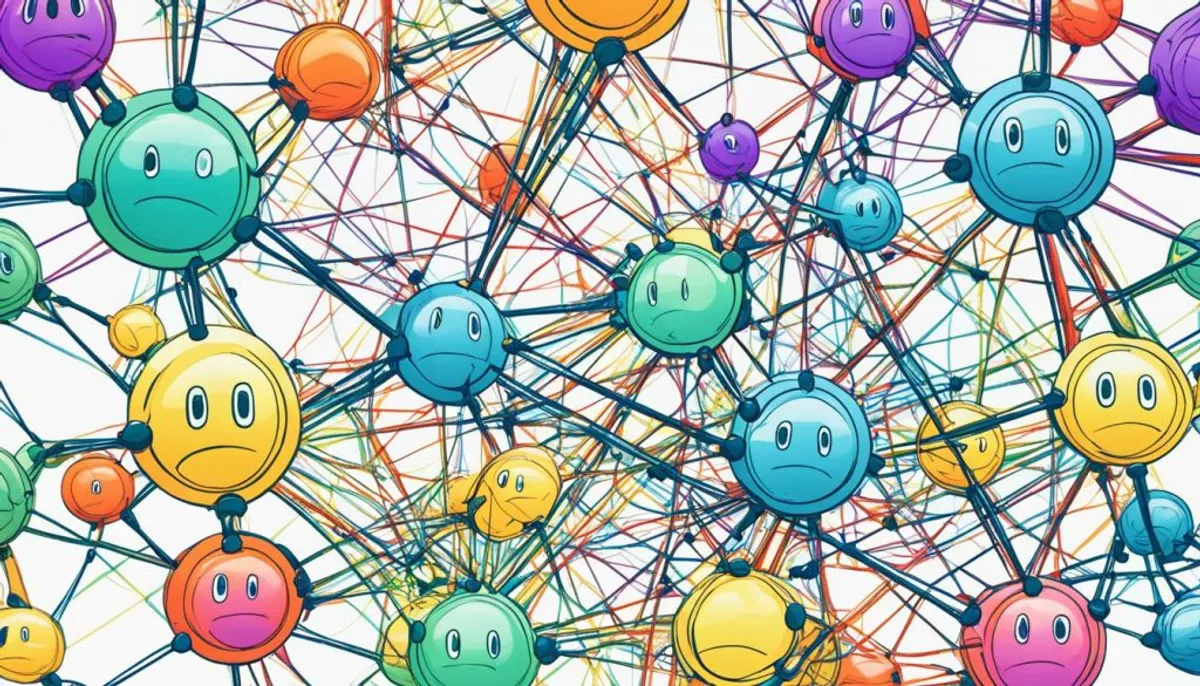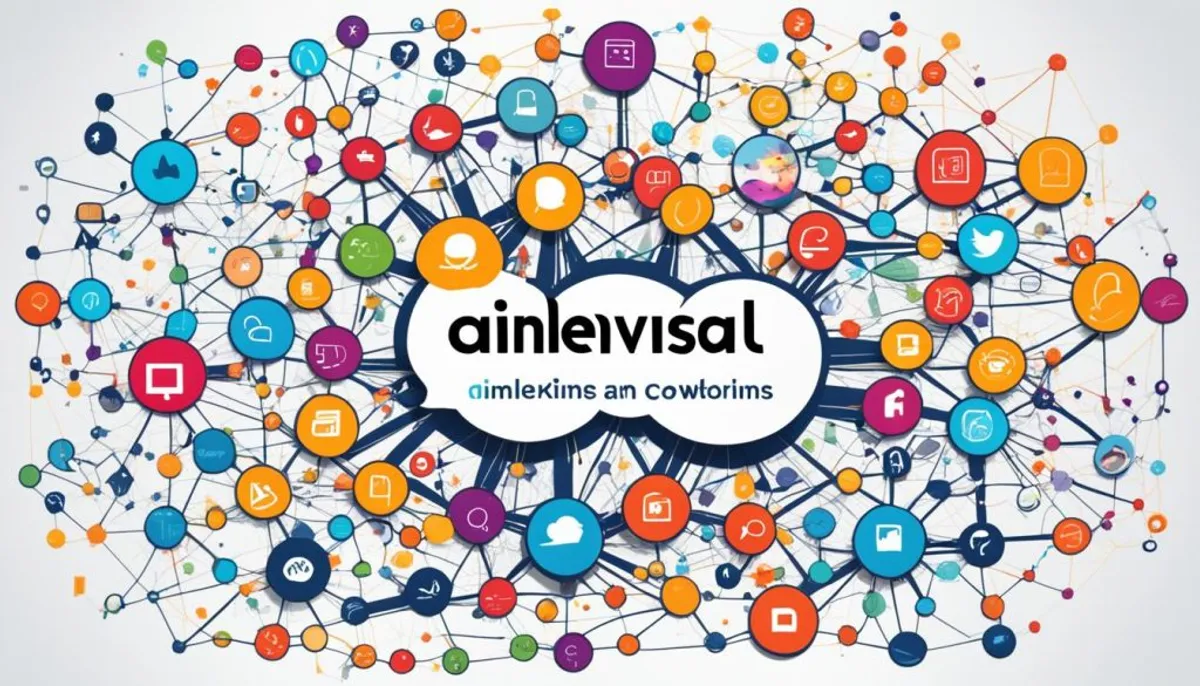Social networking is a big part of our lives today. But what is it really about? It’s about websites and apps that help people and groups talk, share, and make friends. It connects us with others, whether they’re close to us, far away, or have similar hobbies.
Facebook, Twitter, Instagram, and TikTok are big names in this world. They keep us in touch with friends, update us on world events, and let us share stories. As of January 2022, an impressive 4.74 billion people are using these platforms globally, notes DataReportal.

Key Takeaways:
- Social networking refers to websites and apps that enable users and organizations to connect and communicate.
- It allows people to connect with others in their local communities, with families and friends, and with those who have similar interests.
- Popular social networking sites include Facebook, Twitter, Instagram, and TikTok.
- As of January 2022, there are over 4.74 billion social network users worldwide.
- Social networking provides opportunities for social connections, learning, and sharing information.
How Does Social Networking Work?
Social networks are a big part of our daily life. Ever wondered how they work? Let’s dive into how social networking connects people online and offline.
When you join a site like Facebook, Instagram, or LinkedIn, you can connect with people across the globe. You make a profile to show who you are online. This profile lets you share your interests, photos, and what you’re up to.
These sites store and organize info in a user-friendly way. They use advanced programming so data is easy to find and use.
After making your profile, you can add friends or follow others. This lets you see their posts and interact. It helps you meet people who share your interests, online and in the real world.
Social networks suggest friends and groups you might like. They look at who you follow and what you like. This helps you discover new people and interesting groups.
These sites make talking to others easy. You can message people one-on-one or in groups. You can also join online communities with similar interests or goals, including an internal social network that fosters collaboration and connection among users.
Image:
“Social networks connect our digital and real lives. They help us make new friends and keep in touch.”
Social networks let people express themselves and connect with others. They’ve changed how we interact online, offering ways to communicate, network, and have fun. We can do all this from our devices.
Now you know how social networks work. These platforms serve many purposes. They’re used for making friends, professional networking, and more. There’s a lot to explore in the world of social networking.
The Purpose of Social Networking
Social networking platforms are key in our digital lives. They help us connect, share info, learn, and market.
Sharing Information and Connecting with Others
Social networking helps us share news with friends and family. We can post updates, photos, and videos. It makes us feel close, no matter the distance.
This connection keeps relationships strong. It does not matter where we are.
Learning and Accessing Information
Social media gives us news and updates fast. We learn about the world and what our friends are doing.
It’s good for following news outlets and joining groups. We find a lot of info easily.
Enhancing User Interactions
It removes barriers, making talks and projects easy. We feel part of a community with shared interests.
People find groups and join discussions. They meet others like them, creating strong bonds.
Marketing and Brand Awareness
Businesses use it to grow and connect with customers. It’s an affordable way to show off products and build loyalty.
They reach a big audience, helping their brand. This leads to growth.
Social networking does a lot for us. It keeps us together, informed, and helps businesses grow. It’s valuable for personal and professional reasons.
Different Types of Social Networking
There are many kinds of social networking sites. Each kind offers unique experiences based on what users need and like. Here’s a quick look at some key types:
- Social Connections: These sites help you keep in touch with friends, family, and others. You can share news, photos, videos, and chat.
- Professional Connections: These are for career-minded individuals. They offer chances for growth, networking, and finding job opportunities. You can meet people in your field and find new opportunities.
- Sharing of Multimedia: Here, people can share and enjoy photos and videos. It’s great for those who love being creative and viewing others’ creativity too.
- News or Informational Networks: These platforms are all about news and useful information. Users can post stories, share valuable content, and talk about hot topics.
- Communication Networks: They are made for messaging and calls, either one-on-one or in groups. It makes staying in contact easy and quick.
- Educational Networks: Aimed at education, these sites support learning and teaching online. They’re perfect for students, teachers, and anyone wanting to learn something new.

Every social networking site has its own focus and appeals to different people. They help us stay connected, grow professionally, share our creativity, stay in the know, chat, or learn new things. The advantages of social networking enrich our lives in many ways.
Advantages and Disadvantages of Social Networking
Social networking sites offer many benefits for people and companies. It’s important to know these advantages to use social networking well. Here are the main benefits:
- Brand Awareness: These platforms help companies increase brand awareness. They reach a wide audience and promote their products or services.
- Instant Reachability: Social networking lets people and companies quickly connect with others. This encourages real-time talk and involvement.
- Building a Following: Individuals and businesses can create a loyal base of supporters, fans, and customers on these sites.
- Business Success: Using social networking can broaden a company’s reach. It attracts new customers and boosts sales, leading to success.
- Increased Website Traffic: Companies can use social networks to bring more visitors to their websites. This increases visibility and potential sales.
But, it’s also key to look at the downsides of using social networking:
- Spread of Misinformation: False information and rumors can spread quickly on these platforms.
- Negative Reviews and Comments: People and companies might face harmful reviews or comments.
- Data Security and Privacy Concerns: There might be risks to data safety and privacy on these sites.
- Time-Consuming Nature: Keeping up social media profiles and engaging with the audience takes a lot of time and effort. Additionally, one of the significant disadvantages of social networking is the potential for negative impacts on mental health and well-being.
Thinking carefully about social networking’s good and bad sides is necessary. By knowing both, people and businesses can plan their online activities better. This way, they can achieve the results they desire.
Social Networks in Business
Businesses can use social networks for growth and success. These platforms allow businesses to connect with their audience and get customer feedback. They also improve marketing strategies.
Social Media Marketing
Social media marketing is crucial for businesses on social networks. By being active on Facebook, Instagram, and Twitter, they reach more people and build their brand. They can create strategic content and use ads to drive website traffic, get leads, and boost sales.
Customer Research
Social networks are great for collecting customer data and insights. By interacting on LinkedIn and Reddit, businesses learn more about what their customers like and need. This info helps with making products, marketing, and figuring out customer groups.
Engagement and Marketing
Being engaged is key to doing well on social networks. Businesses should join conversations, answer questions, and share useful content. This builds strong social connection and connections. Social networks are also good for contests and promotions, which increases loyalty.
Internal Social Networks
More companies are using internal social networks like Slack or Microsoft Teams. These platforms help employees talk and share ideas, no matter where they are. They make teamwork better, share knowledge easily, and make things run smoothly. This helps everyone work better and be happier at work.
Social networks give businesses many chances to improve their marketing, connect with customers, and grow. Using social media, doing customer research, engaging well, and using internal networks are great strategies. These can help businesses succeed.
What is a Social Network?
A social network is a digital place for people to connect and share. Here, they can chat, share photos, and explore interests together. It’s like a big online community. Social networks are key to how we talk and meet today. They help us connect and share with people all over.
On these sites, you can create your own space. You can let others know about your hobbies and post pictures or videos. By linking up with others, you grow your circle of friends. You also find out about new things and stay in the know.
These networks have cool features for chatting and meeting others. You can find friends and family or meet people who like what you do. Join groups to talk about your hobbies with others like you. Some networks even help you find jobs and connect with companies.
Examples of popular social networks include:
- Facebook: A place to catch up and share with friends and family.
- Instagram: Great for photos and videos, with lots of ways to interact.
- TikTok: Share short, fun videos to show off your creativity.
- LinkedIn: Helps you make work connections and find new jobs.
- Pinterest: Discover and save creative ideas and inspirations.
- Reddit: Join discussions on a wide range of topics you’re into.

Why Social Networks are Popular
Social networks connect us with people across the globe. They make chatting easy and let us share our lives and ideas. These networks give us a sense of community. We can stay in touch with loved ones no matter where they are. Plus, they’re a place to express ourselves and meet people who get us.
The Impact of Social Networks
Social networks have changed how we talk, share, and get information. They’ve made socializing exciting, letting us meet others easily. They’re great for businesses too, for marketing and talking to customers. But, we should use them wisely. We must watch out for privacy issues and wrong information.
| Pros of Social Networks | Cons of Social Networks |
|---|---|
| 1. Enhanced connectivity and communication | 1. Privacy concerns and data security risks |
| 2. Opportunities for self-expression and creativity | 2. Spread of misinformation and fake news |
| 3. Access to a wide range of information and resources | 3. Cyberbullying and online harassment |
| 4. Networking and career opportunities | 4. Social media addiction and time consumption |
| 5. Online communities and support networks | 5. Negative impact on mental health |
Major Social Networking Platforms
Several big platforms dominate the world of social networking. Each offers its own special features. They cater to different kinds of users, providing various ways to connect.
1. Facebook
Facebook is massive, with billions logging in daily. Users reconnect with friends and family, share life moments, and get involved with groups. They can also interact with businesses.
2. Instagram
Instagram centers on sharing visuals like photos and videos. It’s a space where people can express themselves, follow trends, and talk to others through comments or messages.
3. Twitter
X lets people send out brief messages, or tweets. It’s known for quick updates and conversations. People follow celebrities, get news, and interact with various entities.
4. LinkedIn
LinkedIn is for professional networking. It aids in career growth and connects colleagues. It’s also a great place to find new job opportunities.
5. Pinterest
Pinterest focuses on visual inspiration. People use it to find ideas for fashion, home, and more. Users save what they love on boards.
6. Reddit
Reddit features news, discussions, and community groups called subreddits. It’s a hub for asking questions and sharing views. The community votes content up or down.
These social networking sites have changed how we connect and share, enabling enhanced connectivity. They offer unique ways to stay in touch, find ideas, or grow professionally.
Pros and Cons of Social Networking
Social networking is a big part of our lives today. It offers many benefits and some drawbacks too. Knowing the good and bad can help us make better choices about using social media.
Advantages of Social Networking
- Staying connected with friends and family: Social networks make it easy to keep in touch with loved ones, no matter how far they are.
- Finding new connections: These sites help us meet people who share our interests. This can lead to new friendships and business chances.
- Promoting brands: Companies use social networks to make their brands more popular. They can reach more people and connect with customers in a friendly way.
- Accessing a wide range of information: Social networks have tons of info on many topics. They help us learn, stay updated, and see different views.
Disadvantages of Social Networking
- Spread of misinformation: On social networks, false news can spread quickly and trick users.
- Privacy concerns: Sharing personal info online can lead to privacy issues and data theft.
- Cyberbullying: These platforms can also be places where people experience bullying and negativity, which is harmful.
- Social media addiction: Using social networks too much can become an addiction. This affects work and personal life.
- Cost and time commitment: Running social media profiles well needs time, effort, and sometimes money. This can be hard for both people and businesses.
Making smart choices about social networking lets us enjoy a balanced digital life. It also helps businesses use social media wisely, getting the most out of it while avoiding problems.
| Advantages | Disadvantages |
|---|---|
| Staying connected with friends and family | Spread of misinformation |
| Finding new connections | Privacy concerns |
| Promoting brands | Cyberbullying |
| Accessing a wide range of information | Social media addiction |
| Cost and time commitment |
Conclusion
Social networking has changed how we connect and interact. It’s now a key part of our lives. It offers many chances for connection, talking, learning, and growing a business. People can easily keep up with friends and family, share what they love, and find lots of information.
For companies, social networking is a strong marketing tool. It helps with getting customers interested and promoting the brand. By using these platforms, businesses can reach more people, have a strong presence online, and make real connections with their audience. An internal social network lets companies talk directly to customers, get important feedback, and offer tailored experiences.
But, there are challenges and downsides to social networking. Issues like privacy, false information, and the harm of too much social media use are important to think about. Knowing the pros and cons of social networking helps people and businesses make smart choices. This way, they can enjoy the benefits and avoid the risks.
In summary, social networking has reshaped our ways of connecting, talking, and doing business. It’s vital for keeping in touch, finding new interests, and getting information. As we move forward in the digital world, it’s crucial to use social networking wisely. We should always think about privacy, staying true to ourselves, and being responsible online.
FAQ
What is the definition of social networking?
Social networking is when websites and apps help people and groups talk, share, and make friends.
How does social networking work?
Social networking connects people online and offline. On these sites, users share and enjoy others’ posts using their devices.
What is the purpose of social networking?
It’s all about sharing, making friends, learning, and marketing on these networks.
What are the different types of social networking?
Social sites vary. They include making friends, professional connections, sharing media, getting news, talking, and learning online.
What are the advantages and disadvantages of social networking?
Benefits include marketing, instant contact, gaining followers, success, and increased website traffic. Downsides are false info, bad comments, privacy issues, and the effort needed to manage accounts.
How can businesses benefit from social networks?
Companies use social media to research and engage with customers. They can market effectively, build communities, and learn about customer preferences.
What is a social network?
It’s a site or app for people to hang out and share on a common platform.
What are the major social networking platforms?
The big players include Facebook, Instagram, X, LinkedIn, Pinterest, and Reddit.
What are the pros and cons of social networking?
Pros are staying in touch, meeting new people, promoting brands, and finding information. Cons include misinformation, privacy issues, online harassment, cyberbullying, addiction, and the effort and cost of managing profiles.
What is the conclusion about social networking?
Social networking is key today. It helps us keep in touch, learn, and grow businesses. It offers many chances but comes with challenges like privacy and misinformation.
RelatedRelated articles



